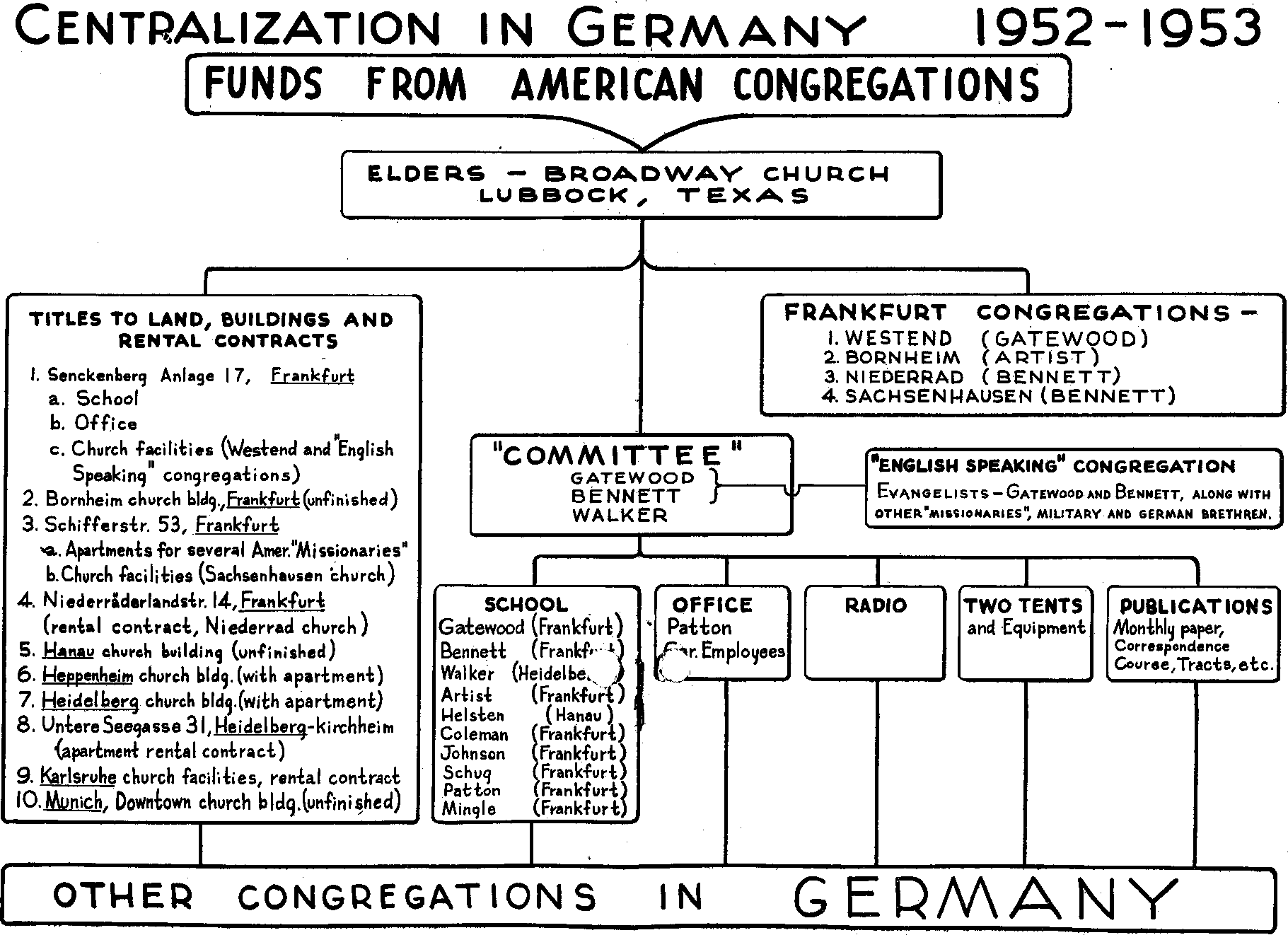Reviewing The Recent Past: Centralized Control And Oversight
The Diagram
Spread out over this page and the next is a diagram which sets forth a true and accurate picture of the organization of the work in Germany during the years 1952-1953. There may have been some minor changes made in recent weeks; but the overall picture remains the same. This chart was prepared by one of the workers in Germany, who had been working there almost from the very start of that work, and who was in a position to have absolute knowledge concerning the workings and business arrangements of the various groups. You can rely on the chart as being accurate.
Same Problem
Some brethren are not yet aware that in ALL the controversies of recent years in which the Gospel Guardian has taken part, we are in reality dealing with the same problem — institutionalism in one guise or another. Whether in the field of foreign evangelism, benevolence, radio network programs, or even church contributions to colleges, we are facing the same basic error. It does not always come to the surface in the same fashion; but the problem is the same. It goes right back to the idea of the "church universal" acting under a single agency or directorship. It is the fundamental fallacy behind the Missionary Society movement.
"The Cooperation Controversy"
Remember the nine or ten articles Brother Cecil N. Wright wrote two or three years ago, and which were later published in tract form under the above title ? Well, Brother Wright spent most of his space trying to show the inconsistency of some who had written for the Gospel Guardian, but in the one brief effort he did make to give a scriptural authority for the centralization of funds and power under one eldership, to be administered by them in behalf of all the contributing churches, he advanced the same argument, using the same scriptures, that have been used in all of these controversies — the passages having to do with the collection for the poor in Judea. But the difference which he never could quite reconcile between that example and modern practices was that in the New Testament example the "sponsoring" elders were receiving help from many sources to relieve an emergency in their own congregation.
Authority Of Elders
Through the several years of this developing controversy now the "sponsoring church" brethren have gradually been driven by the very logic of the situation to the point of claiming that the work they are doing (whether in benevolence, radio, or foreign missions) is peculiarly, exclusively, and specifically THEIR work, and that other congregations are simply assisting them to meet an emergency in their own work which they could not meet otherwise. No matter how incongruous the claims may be with the facts, they have been slowly forced to the realization that this is the only ground that can give any semblance at all of New Testament authority. So they have taken it. Some, however, more realistic as to the actualities and at the same time less informed as to the scripture principles involved are saying that these great "coops" are simply expediencies by which thousands of churches can combine to do THEIR (not the "sponsoring church") work. And so the matter stands.
Brother Otey
Brother W. W. Otey, now nearing his ninetieth year, writes us that we are now facing in the church precisely the conditions and arguments that were faced sixty years ago when the split took place between the Church and the digressives. History may repeat itself — but we want to repeat, over and over again, that IT NEED NOT BE SO! There is no law either of God or man that demands the making of the same mistakes, the following of the same heart-rending trail of broken fellowships, broken hearts, and broken lives. If the brethren promoting the "co-ops" will only seriously study the question "What is wrong with the Missionary Society?" the church may yet be saved. Will they do it? We have the promise of some articles on that subject. We await them eagerly.
